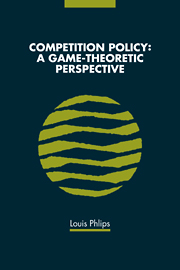3 - Cartel laws are good for business
Published online by Cambridge University Press: 23 September 2009
Summary
Cartels that affect trade between Member States are illegal in the EC, according to Article 85 of the Roman Treaty. Member States have their own competition law that makes cartels affecting trade inside their countries illegal. These ‘cartel laws’ are being actively enforced by EC and national authorities. This is certainly in the interest of the consumers, since prices can be expected to be lower in an environment where binding agreements are not permitted. At first sight, the producers should suffer, since they have a reduced opportunity to increase profits by collusion.
Selten (1984) argues that this intuition is not necessarily correct. Joint profit maximisation is likely to attract new entry. When collusion is effectively prevented (explicit as well as tacit collusion: tacit collusion is ignored for the sake of exposition), there may be fewer competitors around, with the result that producers make higher profits on average than when they collude. This ‘entry effect’, that is, the influence of cartel laws on the number of competitors, counteracts the advantages of collusion in terms of individual profits. Is this counter-influence sufficiently strong to make cartel laws desirable for business from the point of view of profit maximisation? Under reasonable assumptions it is, because cartel laws increase the expected sum of all profits.
This question is tackled here rather than at the end of the book, because the model used to answer it is very close to the one discussed in the previous chapter.
- Type
- Chapter
- Information
- Competition PolicyA Game-Theoretic Perspective, pp. 39 - 46Publisher: Cambridge University PressPrint publication year: 1995



